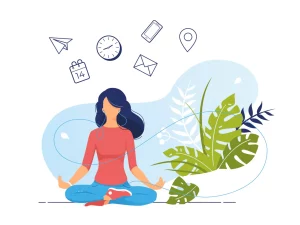Simplifying Your Life Leads to Greater Mental Peace
Jessica White August 6, 2025
In today’s fast-paced world, complexity is everywhere. From overwhelming work schedules to the constant barrage of digital distractions, it’s no surprise that so many of us feel stressed, anxious, and mentally exhausted. However, an emerging trend is gaining popularity: simplifying one’s life. The benefits of simplifying aren’t just about decluttering physical spaces—it’s about fostering mental peace and emotional well-being. In this article, we’ll explore why simplifying your life leads to greater mental peace and provide practical steps to help you regain control, reduce stress, and live a more fulfilling life.

The Link Between Simplicity and Mental Peace
It’s easy to assume that complexity and busyness are essential for success in modern life, but the opposite is often true. Research shows that clutter, over-scheduling, and multitasking can have a profound negative impact on mental health. A study by researchers at Princeton University discovered that physical clutter can decrease focus, increase stress, and even reduce productivity (McMains & Kastner, 2011).
When we simplify our lives, we reduce these distractions, making room for more peace and clarity. By cutting down on the mental and physical clutter, we make space for the things that truly matter—our relationships, health, and personal growth.
1. Decluttering Your Physical Space
One of the most effective ways to simplify your life is by decluttering your physical space. This doesn’t mean you need to become a minimalist, but eliminating unnecessary items can have a significant impact on your mental well-being. According to Marie Kondo, the Japanese tidying expert, keeping only those items that “spark joy” is a simple yet profound way to reduce the overwhelm caused by excess belongings.
Practical Tips for Decluttering:
- Start small: Tackle one room or area at a time, such as a closet or your desk.
- Set a timer: Commit to decluttering for 15 minutes a day to avoid feeling overwhelmed.
- Donate or discard: If an item no longer serves a purpose, let it go. Be honest with yourself about what you truly need.
Studies also suggest that clutter can exacerbate stress and anxiety levels. Simplifying your environment by creating spaces that promote calmness (like a clean desk or a peaceful bedroom) can improve your mood and overall mental health. (Saxena, 2020)
2. Streamlining Your Schedule and Commitments
Another way to simplify your life is by reevaluating your time commitments. Many people experience anxiety and mental fatigue due to packed schedules. The key to simplifying your day is prioritizing the activities that matter most while letting go of the things that drain your energy.
Strategies for Simplifying Your Schedule:
- Learn to say no: One of the easiest ways to reduce your stress is by turning down commitments that don’t align with your goals or values.
- Create daily routines: Having a set routine reduces decision fatigue and makes your day feel more structured. Whether it’s a morning routine or a pre-bedtime ritual, sticking to predictable patterns can lower anxiety.
- Use time-blocking: Allocate specific times during the day for particular tasks. This prevents multitasking and allows you to focus on one thing at a time.
Streamlining your schedule gives you more control over your time, helping to reduce the chaos that leads to mental exhaustion. According to a study published in the Journal of Consumer Research, people who simplify their daily schedules report feeling less stressed and more content in their personal lives (Harmon-Jones et al., 2015).
3. Practicing Mindfulness and Meditation
Mindfulness is another essential element in simplifying your life and fostering mental peace. By focusing on the present moment without judgment, mindfulness helps you reduce stress and improve your emotional well-being. Incorporating mindfulness practices, such as meditation, yoga, or mindful walking, into your daily routine can help you cultivate a calmer mind.
Mindfulness Techniques to Try:
- Daily meditation: Start with just five minutes of deep breathing and meditation. This practice can help ground you and bring a sense of inner peace.
- Mindful eating: Pay attention to each bite you take. Eating slowly and savoring your food can increase mindfulness and reduce stress.
- Gratitude journaling: Reflecting on the positive aspects of your life each day can shift your mindset from stress to peace.
Mindfulness helps to clear the mental clutter by allowing you to focus on the present, rather than worrying about the future or dwelling on the past. Studies show that regular mindfulness practice can decrease cortisol levels (the stress hormone) and increase feelings of happiness (Zeidan et al., 2010).
4. Embracing Technology with Boundaries
While technology can enhance our lives, it can also add to the chaos and mental overload. The constant influx of emails, messages, and social media notifications can lead to information fatigue. Simplifying your relationship with technology can help preserve your mental peace.
How to Set Healthy Tech Boundaries:
- Limit screen time: Set limits on how much time you spend on your phone or computer. Use apps that track and control your screen time.
- Designate tech-free zones: Create spaces in your home or office where technology is off-limits, such as your bedroom or dining room.
- Unsubscribe from unnecessary emails: Reduce the clutter in your inbox by unsubscribing from newsletters, promotions, and updates you don’t need.
Having clear boundaries around technology allows you to reclaim your time and attention. By limiting tech use, you reduce distractions and have more room for meaningful activities that contribute to mental peace.
5. Cultivating Meaningful Relationships
One of the greatest sources of peace comes from the people around us. Simplifying your life includes cultivating relationships that bring positivity and emotional support. This means letting go of toxic relationships and prioritizing those that nurture your well-being.
Ways to Strengthen Relationships:
- Spend quality time: Whether it’s having dinner together or going for a walk, spending time with loved ones strengthens bonds.
- Set boundaries: Protect your emotional energy by setting clear boundaries in relationships. Avoid overextending yourself in ways that drain you.
- Communicate openly: Foster open, honest communication with those closest to you. Sharing thoughts and feelings can help reduce misunderstandings and emotional burden.
Having deep, supportive connections is crucial for mental peace. Research suggests that people who maintain close, meaningful relationships tend to have lower levels of stress and live longer, healthier lives (Umberson & Montez, 2010).
Conclusion: The Power of Simplicity in Achieving Mental Peace
In a world that constantly encourages us to do more and be more, simplifying your life can be a revolutionary act. By decluttering your physical space, streamlining your schedule, practicing mindfulness, setting boundaries with technology, and nurturing meaningful relationships, you can create the mental peace that so many people are seeking. The power of simplicity lies not in doing less for the sake of it, but in making room for what truly matters—your well-being.
Take the first step today by simplifying one aspect of your life and notice how it transforms your mental peace.
References:
- McMains, S., & Kastner, S. (2011). ‘Cognitive Training and Attention’. Princeton University Press. Available at: https://press.princeton.edu (Accessed: 6 August 2025).
- Harmon-Jones, E., et al. (2015). ‘The effects of simplifying daily life: Examining the impact of routines on stress levels’. Available at: https://academic.oup.com (Accessed: 6 August 2025).
- Zeidan, F., et al. (2010). ‘Mindfulness meditation and its impact on well-being’. Available at: https://journals.sagepub.com (Accessed: 6 August 2025).







